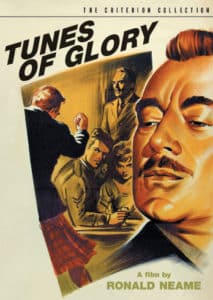 Tunes of Glory directed by Ronald Neame is a film about the Scottish Battalion in the period after the war. Major Jock Sinclair, acting Colonel of the Regiment, has been this position for a long time. He is looked up to and respected by officers and men alike who assume he will be appointed their commanding officer. He informs the men that he will be replaced with Colonel Basil Barrow. Jock Sinclair is trusted by the men because he is approachable and lenient towards the rules. The men can also relate to him, as he started in the army as a soldier and worked his way up to his position. We learn that General Basil is quite opposite Sinclair. He is a strict disciplinarian and as he tries to impose his own style of leadership on his command, he struggles to gain respect and loyalty from the other officers and men. He works by the books, believing that all order and respect will come with the following of rules. Campaigns are thrown against the men which leads to tragic results for both of them.
Tunes of Glory directed by Ronald Neame is a film about the Scottish Battalion in the period after the war. Major Jock Sinclair, acting Colonel of the Regiment, has been this position for a long time. He is looked up to and respected by officers and men alike who assume he will be appointed their commanding officer. He informs the men that he will be replaced with Colonel Basil Barrow. Jock Sinclair is trusted by the men because he is approachable and lenient towards the rules. The men can also relate to him, as he started in the army as a soldier and worked his way up to his position. We learn that General Basil is quite opposite Sinclair. He is a strict disciplinarian and as he tries to impose his own style of leadership on his command, he struggles to gain respect and loyalty from the other officers and men. He works by the books, believing that all order and respect will come with the following of rules. Campaigns are thrown against the men which leads to tragic results for both of them.
By the acting in this film, the characters give a clear and concise idea of the Battalion and how everything was based upon loyalty and respect. The respect given by the men to Basil is merely based on force whereas Sinclair’s respect is because of relations and personal aspects. The men responded much better to Jock Sinclair’s position as General, yet the success of an army is more likely to be acquired through a leader of demanded perfection. Basil prepared the men for the worst situations for the war, it was because of this that his ways were more effective.
Sinclair believed that the purpose of life is to achieve happiness, where Kantian ethics comes into play. He thought that in order for his men to be successful, he had to make sure they were happy and enjoy what they were doing. He still brought order and discipline where necessary, but also made sure of their happiness, which resulted in success given by the men. Immanuel Kant is the philosopher of Kantian ethics, which can relate to Sinclair’s efforts and beliefs. Utilitarianism is based on the statement, ‘The greatest good for the greatest number of people.’ General Basil’s beliefs are related to Utilitarianism because he, like the philosopher Jeremy Bentham, believed in order and making everyone, including himself, happy.
This film, in my opinion, was not one I would recommend to people looking for an interesting or deeply meaningful film. It did not grab my attention as I almost fell asleep watching it. However, the storyline shows relation to philosophical ideas and beliefs, which is a good factor. I would recommend this movie to anyone who enjoys stories after the war and older films.
